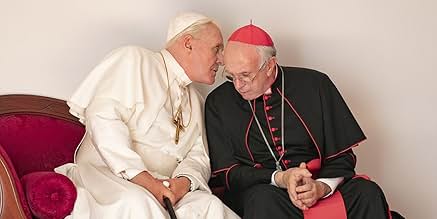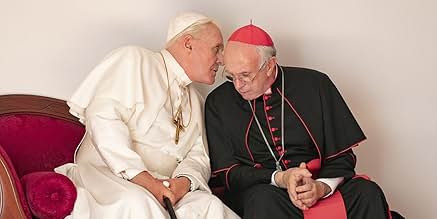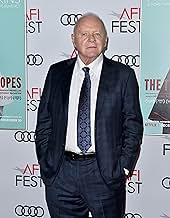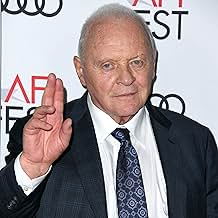Por trás dos muros do Vaticano, o tradicional Papa Bento XVI e o futuro reformador Papa Francisco tentam encontrar um caminho para o futuro da Igreja Católica.Por trás dos muros do Vaticano, o tradicional Papa Bento XVI e o futuro reformador Papa Francisco tentam encontrar um caminho para o futuro da Igreja Católica.Por trás dos muros do Vaticano, o tradicional Papa Bento XVI e o futuro reformador Papa Francisco tentam encontrar um caminho para o futuro da Igreja Católica.
- Direção
- Roteirista
- Artistas
- Indicado a 3 Oscars
- 11 vitórias e 57 indicações no total
Germán De Silva
- Father Yorio
- (as Germán de Silva)
Sofia Cessak
- Amalia Damonte
- (as Sofia Mayra Cessak)
Vincent Riotta
- Driver
- (as Vince Riotta)
Daphne Mereu
- Gandolfo Nun
- (as Daph Mereu)
Avaliações em destaque
Many have started with 'I am not Catholic' as if that is a prerequisite for enjoying the movie. I am not a female and have enjoyed many movies about women. I never served time in prison but have certainly received rich rewards from dramas about prison.
I am not British but I enjoy English actors, who have far more formal training in classical drama than Americans. And these two actors are among the very best ever. The drama may be accurate or not, it does not matter. It is clear that one pope had a different style than the other. Both were sincere on their beliefs and both were men of faith.
I am an atheist but loved the film. That is because I am a skeptical atheist and as I age I think about what a person of faith might feel at my age that I do it feel. Above all,else it is a movie about things we have never seen or thought of, philosophical differences at the highest rank of highest ranks of the Church.
Bravo Netflix!
I am not British but I enjoy English actors, who have far more formal training in classical drama than Americans. And these two actors are among the very best ever. The drama may be accurate or not, it does not matter. It is clear that one pope had a different style than the other. Both were sincere on their beliefs and both were men of faith.
I am an atheist but loved the film. That is because I am a skeptical atheist and as I age I think about what a person of faith might feel at my age that I do it feel. Above all,else it is a movie about things we have never seen or thought of, philosophical differences at the highest rank of highest ranks of the Church.
Bravo Netflix!
Being inaugurated as a new pope in the last century must have been a source of enormous pride. But there must also have been a nagging thought... at some point you are going to be paraded, stiff as a board, around your work courtyard before being taken back inside to your place of work and buried there!
All that changed in 2013 when Pope Benedict XVI resigned, the first pope to voluntarily do so since Pope Celestine V in 1294. (Pope Gregory XII also resigned in 1415, but he was effectively forced to).
This movie tells the story of that curious situation, when Cardinal Jorge Bergoglio (played by Jonathan Pryce) ended up as Pope Francis while Benedict (Anthony Hopkins) was still alive. The official reason for the pope's resignation appears to have been his advanced age. But the film paints a rather different picture.
The movie starts back in 2005 as we enter the papal conclave. Benedict (Cardinal Ratzinger, as was) is the highly-political German cardinal who desperately wants the papacy; Bergoglio is the highly respected Argentinian cardinal who doesn't seek the office but might have it thrust upon him. (Clearly, when the white smoke clears, history has dictated the outcome).
But flash forward to 2013 and Bergoglio will get another bite of the cherry. Is he worthy of the role? Through flashbacks we return to Perón's unsettling rule over Argentina and the events that made the man.
The two stars are simply outstanding together, and it's no surprise at all that both have been nominated in the Oscar acting categories. They are almost joint leads. But - perhaps to give the film its best awards-season shot - Pryce is down for Best Actor and Hopkins is down for Best Supporting Actor.
Anthony Hopkins in particular for me shone with the brilliant quietness and subtle facial movements that are the mark of a truly confident actor. Less is more.
I was enjoying this movie enormously up until we flashed back to the Argentinian sub-plot. Set in the time of Perón's "Dirty War" when a huge number of people - estimates range from 9,000 to 30,000 - simply went "missing". There's nothing wrong with this sequence of the film. For example, a reunion of Bergoglio with a persecuted priest, Father Jalics (Lisandro Fiks) - is brilliantly and movingly done. It's just that for me it seemed so disjointed. It was jarring to switch from this Evita-era drama to the gentle drama of the papal plot.
If the movie had been 30 minutes shorter and focused on the mental struggles of Benedict I would have preferred it. Curiously - we don't really get to fully understand his divergence from the faith. Bergoglio gets no end of back-story. But Ratzinger's is probably just as interesting, but not explored.
This is still a really fine movie and will appeal to older folks who like a story rich with character acting and not heavy on the action or special effects. The director is Fernando Meirelles (who interestingly directed the Rio Olympics opening ceremony!) and it's written by Anthony McCarten, the man behind the screenplays for "The Theory of Everything", "Darkest Hour" and "Bohemian Rhapsody".
You may still be able to find this in selected cinemas (e.g. Curzon) but it is also streaming on Netflix, which is where I had to watch it.
(For the full graphical review, please check out One Mann's Movies on the web or Facebook. Thanks).
All that changed in 2013 when Pope Benedict XVI resigned, the first pope to voluntarily do so since Pope Celestine V in 1294. (Pope Gregory XII also resigned in 1415, but he was effectively forced to).
This movie tells the story of that curious situation, when Cardinal Jorge Bergoglio (played by Jonathan Pryce) ended up as Pope Francis while Benedict (Anthony Hopkins) was still alive. The official reason for the pope's resignation appears to have been his advanced age. But the film paints a rather different picture.
The movie starts back in 2005 as we enter the papal conclave. Benedict (Cardinal Ratzinger, as was) is the highly-political German cardinal who desperately wants the papacy; Bergoglio is the highly respected Argentinian cardinal who doesn't seek the office but might have it thrust upon him. (Clearly, when the white smoke clears, history has dictated the outcome).
But flash forward to 2013 and Bergoglio will get another bite of the cherry. Is he worthy of the role? Through flashbacks we return to Perón's unsettling rule over Argentina and the events that made the man.
The two stars are simply outstanding together, and it's no surprise at all that both have been nominated in the Oscar acting categories. They are almost joint leads. But - perhaps to give the film its best awards-season shot - Pryce is down for Best Actor and Hopkins is down for Best Supporting Actor.
Anthony Hopkins in particular for me shone with the brilliant quietness and subtle facial movements that are the mark of a truly confident actor. Less is more.
I was enjoying this movie enormously up until we flashed back to the Argentinian sub-plot. Set in the time of Perón's "Dirty War" when a huge number of people - estimates range from 9,000 to 30,000 - simply went "missing". There's nothing wrong with this sequence of the film. For example, a reunion of Bergoglio with a persecuted priest, Father Jalics (Lisandro Fiks) - is brilliantly and movingly done. It's just that for me it seemed so disjointed. It was jarring to switch from this Evita-era drama to the gentle drama of the papal plot.
If the movie had been 30 minutes shorter and focused on the mental struggles of Benedict I would have preferred it. Curiously - we don't really get to fully understand his divergence from the faith. Bergoglio gets no end of back-story. But Ratzinger's is probably just as interesting, but not explored.
This is still a really fine movie and will appeal to older folks who like a story rich with character acting and not heavy on the action or special effects. The director is Fernando Meirelles (who interestingly directed the Rio Olympics opening ceremony!) and it's written by Anthony McCarten, the man behind the screenplays for "The Theory of Everything", "Darkest Hour" and "Bohemian Rhapsody".
You may still be able to find this in selected cinemas (e.g. Curzon) but it is also streaming on Netflix, which is where I had to watch it.
(For the full graphical review, please check out One Mann's Movies on the web or Facebook. Thanks).
I'm not a Catholic, and this movie is very, very Catholic. But beyond that, it's one of the deepest cinematic examinations of faith I've ever seen. Sir Anthony Hopkins and Jonathan Pryce, playing Pope Benedict XVI and Cardinal Jorge Bergoglio (who later becomes Pope Francis) respectively, both deliver brilliant, finely crafted lines with stellar performances. (It's somewhat ironic that two Welsh actors are playing a German and an Argentenian, but most of the film is spoken in English, so it works out in some strange way.) I really didn't follow the most recent transition between Popes, so I had not expected to be so deeply involved with this movie, but I am very glad to have watched it. Highly recommended for its insightful look into the human condition and the underpinnings of faith with its sometimes wavering texture, even for the most religious of us. Beautifully filmed on location in Argentina and the Vatican. If you subscribe to Netflix, then I suggest you watch this movie tonight.
Much has been made of the brilliance of the two title performers, and deservedly so. Both Hopkins and Pryce are absolutely convincing as German and Argentinean pontiffs who converse in English (conveniently for viewers) as their common language. Each actor is so fresh and alive within the personality of his "character" that I was easily persuaded they may be truer to the souls of these men than the living originals.
Not enough credit has been paid to Anthony McCarten, the writer of this complex, layered conversation. It is the kind of dialogue great men wish they had spoken. What courage and skill it takes to undertake such a verbal tour de force.
(Imagine if world leaders couldn't hire speech writers. Could Shakespeare's kings and queens really speak as well as he wrote for them?)
McCarten has written the scripts for three Oscar-winning actors; isn't it time he was recognized?
And Fernando Meirelles is the masterful director who brought all the elements together. This is a renaissance man, adept in many fields, from architecture to cinema--and organic farming as well. He has been nominated for one directing Oscar (for "City of God"), and here he shows his ability to maintain both visual interest and intellectual fascination through two hours of what amounts to an intense, extended talk.
That the movie never felt "talky" is a tribute to all four great artists.
..this was a pleasure to watch. Two exceptional performances which were genuinely deeply moving, framed expertly within the context of the fairly recent selection of the Pope(s). Funny at times and also eye opening as an eduction in traditions and dogma V modernisation and reform of the Catholic Church. Whether you have faith or none at all, this is a truly heart warming, non-sentimental journey in the company of two of Britain's finest actors.
Portrayals of the Pope On Screen
Portrayals of the Pope On Screen
Take a look at actors who have portrayed the Pope in movies and on television. And no, we're not going to spoil Conclave if you haven't watched it yet.
Você sabia?
- CuriosidadesSir Jonathan Pryce commented on his physical resemblance to Pope Francis at the Toronto International Film Festival: "The day Pope Francis was declared Pope, the Internet was full of images of me and him, and 'Is Jonathan Pryce the Pope?' Even my son texted me, 'Dad are you the Pope?'"
- Erros de gravaçãoThe movie implies that Jorge Bergoglio cooperated with the Argentinian junta and therefore was exiled once the rule of the military was over. This is not true. Bergoglio stopped being the provincial superior of the Society of Jesus in Argentina in 1979 (not 1983 as shown in the movie) because his terms were over at this time. After that he wasn't banished but served as the rector of the Philosophical and Theological Faculty of San Miguel in San Miguel until 1986. It is also not true that Bergoglio became fond of liberation theology at this time. The opposite is true - Bergoglio refused to teach his disciples liberation theology and chose a direct pastoral approach instead. This was the reason for his dismissal in 1986.
- Citações
Pope Benedict: In 1978, we had three popes.
Cardinal Jorge Bergoglio: Yeah, but they weren't at the same time.
Pope Benedict: I was making a little joke.
Cardinal Jorge Bergoglio: A joke?
Pope Benedict: A German joke. It doesn't have to be funny.
- Cenas durante ou pós-créditosWhen the Italian, Argentinian and Uruguayan units are listed in the end credits, their respective national flags are shown on the upper left corner of the screen.
- Trilhas sonorasBesame Mucho
Written by Consuelo Velázquez
Principais escolhas
Faça login para avaliar e ver a lista de recomendações personalizadas
Detalhes
- Data de lançamento
- Países de origem
- Central de atendimento oficial
- Idiomas
- Também conhecido como
- Los Dos Papas
- Locações de filme
- Empresas de produção
- Consulte mais créditos da empresa na IMDbPro
Bilheteria
- Orçamento
- US$ 40.000.000 (estimativa)
- Faturamento bruto mundial
- US$ 243.711
- Tempo de duração2 horas 5 minutos
- Cor
- Mixagem de som
- Proporção
- 1.85 : 1
Contribua para esta página
Sugerir uma alteração ou adicionar conteúdo ausente
























